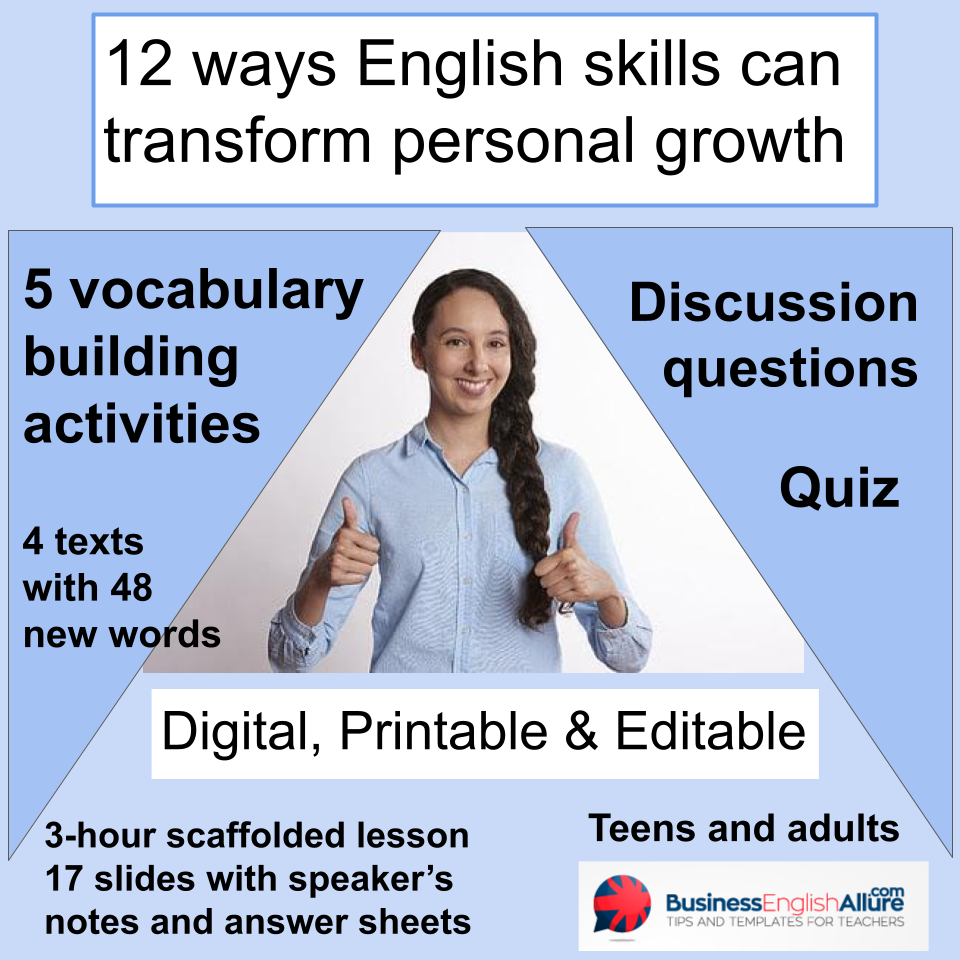7 Steps to Follow Innovative Teachers in EFL on Social Media

As EFL teachers, maintaining motivation and high energy levels can be difficult sometimes. We work alone and prepare alone. What’s always worked for me to pull myself up out of the doldrums was to look for inspiration from another teacher. Often times it was a colleague showing me the latest business English coursebook or sending me a link to a funny video to use in class.
The teacher’s room was sometimes noisy with chatter, encouragements, and pats on the back. Now that I’m semi-retired, I miss that. So I’ve started looking for innovative teachers online especially in social media and I model my courses after them. And so can you.
[stextbox id=”download”]Download the pdf of this article[/stextbox]
What is an Innovative Teacher?
I ran across a survey online published by the University of Nebraska titled “Innovative teaching and teaching improvement” where they asked their professors to respond to three questions:
1) How would you describe the level of changes in the course of your teaching in the last five years?
2) How successful were the changes you made?
3) If something didn’t work how often did you try again?
From their findings, they deduced that innovative teachers are: Passionate, persistent, risk-takers.
Innovators:
- devote time to being better teachers,
- are eager to learn from colleagues,
- seek out ideas on the internet,
- solicit student feedback continuously and view it constructively.
- They persist if a new teaching strategy or activity doesn’t work the first time, they tweak it and try again.
- They adapt in the classroom when things are not going well, and often try new approaches out of desperation which later become ‘innovations’.
Doesn’t that sound like you?
Can you think of some famous innovators in the field EFL? One name comes to mind ‘Dave’s ESL Café’ and Business English Podcast. But there are hundreds of others online who share their ideas and course content freely and give out personalized advice in their comments section.
How to find innovative teachers online?
The last time you did a Google search for a ‘perfect’ EFL lesson and found it, did you happen to think of subscribing to the website or following the teacher on Twitter or Facebook. I’ve started doing this lately and I now have inspiration pouring into my inbox and Facebook and Twitters feeds. From there it’s so easy to mark an article in my favorites or use Evernote to bookmark the page.
You can have daily inspiration coming to you too!
1) The first thing to do
If you haven’t already done so is to create free Facebook, Twitter and LinkedIn profiles.
2) Signup for their newsletter
When you find a cool lesson or video online and you appreciate the style or approach to EFL teaching of this blogger, signup to receive their regular posts in your inbox. I opened a Gmail account just for this purpose.
Let’s look at two innovative teachers from our BusinessEnglishAllure membership who are independent EFL teachers and blog as well. We’ll see how to subscribe to their blog, and follow them on Facebook and Twitter:
Catherine Aygen describes herself on Twitter as an “English language trainer, linguistics enthusiast and lover of the Côte d’Azur”. She’s been an EFL teacher for 17 years and has worked in London, Turkey, Tokyo, Singapore, and Paris.
She has a Masters in Linguistics and a certificate and diploma in TESOL (Teaching English to Speakers of Other Languages). She’s passionate about language-learning and has studied several foreign languages herself – German, French, Turkish and Japanese. and here’s her blog for learners AygenTraining

Yolaine Bodin is an English–French Translator & Teacher. For as long as she can remember, she has always been enthralled by the power of words, how they can affect communication among people. She has a strong interest in world cultures, foreign countries, and languages.
She is a French native and grew up in France, but has worked and lived in Germany, Luxembourg, Belgium and in England where she attended university and graduated to become a teacher of foreign languages. Yolaine has also been employed for many years as an in-house translator and proofreader for a U.S.-based international company. Here’s her blog Yolaine Bodin ‘the Language Nook’
When you visit a blogger’s home page you’ll see a signup form similar to these.


Catherine’s and Yolaine’s.
When you subscribe to a newsletter you’ll need to give your email address and sometimes a little extra information like first and last names so the blogger can personalize the newsletter when it reaches your inbox.
3) Click on Social Media buttons
So you’ve signed up for the newsletter and you will receive that in you inbox, now it’s interesting to follow the blogger on Facebook, Twitter or LinkedIn because they often post and share different material on social media. Take a look around the home page for social media ‘follow’ buttons like these:

And here’s Yolaine’s with ‘follow me’ buttons.

By clicking on the icon you’re taken to their different social media profiles.
4) Check out their Facebook page
Scroll through the posts they’ve published or shared and see if that would be useful content for you. If so, you can ‘Like’ their page and receive updates directly in your FB newsfeed.
Catherine’s FB business page


Yolaine’s personal FB profile
Have you created or joined a FB group yet? It’s so easy. On your personal Facebook profile in the left-hand column, you can explore EFL groups to join like I did. The updates from the various groups you join will show up in your newsfeed. There is lots of inspiring content!
I especially like these FB groups:




5) Look at Twitter for new ideas for courses and videos
Scroll through the tweets they’ve published to see if maybe you’d be interested in ‘following’ them on Twitter. Check out the people or associations they follow and start following them as well. Yolaine has 150 people following her tweets. She follows 216 people. Click on ‘following 216’ to see who she’s following. There’s probably a lot of interesting EFL teachers.

6) Don’t forget LinkedIn. It’s the Facebook for business connections
Look up the names of your colleagues or your boss and ask to be one of their contacts. Here’s Catherine’s LinkedIn profile page. She and I are connected so she’s in my ‘1st circle of friends’. I can take a look at her 219 connections (2nd circle of friends) and could ask her to introduce me to one of them via LinkedIn.

Once you’re connected to someone you can look at their profile which includes their experience, education, skills, and endorsements made by other LinkedIn members.
If you scroll down to the bottom of the profile page, you’ll see which professional groups they belong to and you can easily join those EFL groups. New posts from each group will show up conveniently in your LinkedIn newsfeed or you can ask that you be notified of new posts by email.
Here are the groups Yolaine is following. Just click on the name of the group to join.

Here you can see Yolaine’s activity on LinkedIn: the posts she’s liked or posted herself. LinkedIn is becoming an excellent publishing platform.

7) Try Pinterest for downloadable info-graphics and meet other innovative teachers
I’m a real newbie using Pinterest info-graphics in ESL/EFL but I’m sure Pinterest has an appeal to some of you for its ease of collecting and organizing ‘pins’.
Just signup for a free account at Pinterest.com and log in using your Facebook or Twitter accounts or use your email address.
Choose the categories that interest you like EFL teaching. You can click to follow the suggested ‘boards’ (short for bulletin board) to get started. If you see something interesting, click on it to check it out. There will almost always be a link connecting to the website of the author.
If you scroll down below the info-graphic, you’ll see a ton of other ideas. I love it as inspiration for creating slides, presenting grammatical information, pronunciation…..
You’ll be amazed at how many info-graphics and exercises of all kinds are posted on ‘boards’ in Pinterest. You can ‘pin’ them to your own ‘boards’ in a very organized way according to exercises, grammar, vocabulary building, or whatever.
Before long you will have plenty of inspiration coming to you.
The number of people and associations you will be following grows exponentially! And so will your inspiration!
Not only are we inspired by these innovative teachers, but we can get feedback from them! Don’t hesitate to write a comment in the comments section of a blog or LinkedIn article, or write a comment after one of their tweets. Feedback and words of encouragement from a pro feel good! Besides, the more we share with other teachers, the more support we receive.
If you have any other tips for following experts and innovators in EFL let me know by leaving a comment. I haven’t even looked at Instagram for EFL content, have you? Perhaps you have an EFL blog and social presence too. Let me know in the comments!! Hey and don’t forget to follow me on FB and Twitter where I share content from other teachers with you in mind.
[Update April 22, 2017]
Hey, I found a convenient list of 34 EFL/ESL experts for you to follow.
The post is from Jason Levine and his website FluencyMC.com. In 2016, he asked these 34 experts to give their advice on “How to speak English fluently”. I really enjoyed reading their tips for English learners. See if you agree.
Jason thoughtfully introduced each of the 34 experts and then gave their website address and Twitter link.
So just scroll down the list of experts and if they look interesting to you just click on the Twitter link. Maybe you will recognize some of them from Youtube!
You’ll enjoy his rap-up of suggestions in his practical infographic. https://fluencymc.com/speak-fluent-english/
I’m now following most of them on Twitter including Jason. You will see that they are a diverse group and each expert has his own spin on English language teaching.
{UPDATE April 22, 2017] Another list with 17 experts
Here’s another great list of 17 experts from Sam at englishforstudy.com giving their advice on learning vocabulary.

[stextbox id=”download”]Download the pdf of this article[/stextbox]
Related blog post with a survey of business English teachers using EdTech
Read about how other business English teachers have adapted to online teaching and using EdTech tools. https://www.businessenglishallure.com/changes-to-efl-esl-today-are-you-keeping-up-with-the-times/

About the author: Ellen Dubois is a semi-retired Business English teacher and blogger who shares teaching tips and game templates. She’s an advocate for creating games and competition to foster engagement and fun in the classroom. She hopes to help other teachers find the joy of teaching Business English to adults and to succeed at making a living abroad.
Subscribe and leave a comment
Sign up for my newsletter where you’ll receive new posts with lesson plans for business English and TOEIC preparation as well as EdTech tips about going digital in your classroom. Leave a comment with your own links or those of an inspiring teacher who you admire.









 Our new vocabulary lesson focuses on personal development and growth, two topics that resonate with learners of all ages.
Our new vocabulary lesson focuses on personal development and growth, two topics that resonate with learners of all ages.  By the end of the lesson, your students will be motivated to reach new heights.
By the end of the lesson, your students will be motivated to reach new heights. Check out the 3-hour lesson on TeachersPayTeachers $5
Check out the 3-hour lesson on TeachersPayTeachers $5 





